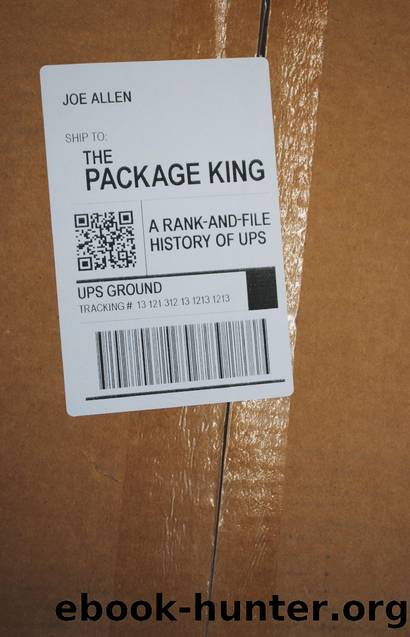The Package King: A Rank-And-File History of Ups by Joe Allen

Author:Joe Allen [Allen, Joe]
Language: eng
Format: epub
Tags: Labor, Labor & Industrial Relations, Political Science, Business & Economics, Corporate & Business History, General
ISBN: 9781642592177
Google: H_3RDwAAQBAJ
Goodreads: 55898856
Publisher: Haymarket Books
Published: 2020-04-07T00:00:00+00:00
PUBLIC HEROES
Many strikers found themselves in the unaccustomed role of public heroes. Complete strangers would bring food and drinks to the picket lines, or shake their hands and thank them for what they were doing.12 There was constant honking of car and truck horns in support of the strikers. Approached by reporters on the first day of the strike, the strikers had been unsure of what to say, but their confidence grew by the day. Depending on the type of hub, most picket lines were a mix of part-time workers, package car drivers, and feeder drivers. To the great surprise of many reporters, many part-timers revealed that they knew more about how the economy worked than most Nobel laureates. Striker Laura Pisciotti told the New York Times while walking the picket line at UPSâs CACH, âThese companies all have a formula. They donât take you on full-time. They donât pay benefits. Then their profits go through the roof.â13 Pisciottiâs work commute took an hour each way, and she worked no more than twenty-five hours a week, earning just a little over $8.00 an hour.
Other strikers echoed this idea: ââPeople donât even look at workers as human beings anymore,â said UPS part-timer Leatha Hendricks. âTo them Iâm just a machine. All they care is you got strength in your back. And when your back goes out of whack, itâs over. Youâre gone.â Linda Borucki, a thirteen-year part-timer at the company, agreed: âYou look around and itâs hard to find real full-time work anymore. How do people expect you to make it?â Mike McCarten, a ten-year part-time UPS worker, said, âYou canât feed your family on promises. You canât make house payments on promises.â14
These and other UPS workers articulated problems that ran through the lives of millions of American workers. If the Teamsters were enjoying a public relations success, UPS was having the opposite experience. The darling of the business community and politicians, UPS and their fawning acolytes found themselves caught in the media spotlight and called out for arrogantly ignoring the strikersâ demands. âWe are willing to continue to discuss the matter with the Teamsters, but we must emphasize that our last, best and final offer remains unchanged,â Kristen Petrella, UPS spokeswoman, told the New York Times three days into the strike.15 Such statements won few friends and influenced no one. They instead reinforced UPSâs image as greedy, insensitive, and out of touch with the needs of workers. Four days into the strike, Dave Murray told the PBS NewsHour, âThereâs a whole lot of part-timers who only want part-time work.â16 Apparently, UPS workers disagreed. In response to the companyâs repeated claims that workers were satisfied with their lot at UPS, Rand Wilson said: âAll the spin doctors in the world canât compensate for what people think and feel.â17
The perennial political melodrama of the 1990sâthe conflict between the Clinton White House and the Republican-controlled House of Representativesâwas blown off the front page for a few weeks.18 New York Times columnist Bob Herbert called the UPS strike âa crusade against low wages.
Download
This site does not store any files on its server. We only index and link to content provided by other sites. Please contact the content providers to delete copyright contents if any and email us, we'll remove relevant links or contents immediately.
| Biographies | Company Profiles |
| Economic History |
Pale Blue Dot by Carl Sagan(5008)
The Rules Do Not Apply by Ariel Levy(4969)
Goodbye Paradise(3810)
Ogilvy on Advertising by David Ogilvy(3622)
Liar's Poker by Michael Lewis(3448)
Delivering Happiness by Tony Hsieh(3425)
Into Thin Air by Jon Krakauer(3399)
Purple Cow by Seth Godin(3203)
Rogue Trader by Leeson Nick(3044)
The Social Psychology of Inequality by Unknown(3031)
The Airbnb Story by Leigh Gallagher(2854)
4 - Harry Potter and the Goblet of Fire by J.K. Rowling(2703)
The Mind Map Book by Tony Buzan(2578)
Bossypants by Tina Fey(2532)
Claridge's: The Cookbook by Nail Martyn & Erickson Meredith(2404)
All the President's Men by Carl Bernstein & Bob Woodward(2377)
Six Billion Shoppers by Porter Erisman(2302)
Master of the Game by Sidney Sheldon(2290)
Alibaba by Duncan Clark(2083)
